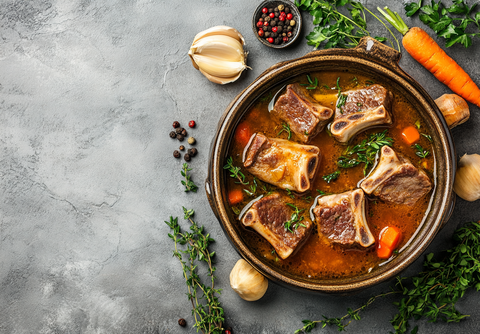

Forever Young...
Collagen - The fountain of Youth.
You’ve probably heard the buzz about collagen, right? It’s been popping up everywhere – from beauty products to protein powders – and for good reason! Collagen is one of the most important proteins in our bodies, acting like the glue that holds everything together. It keeps our skin firm and smooth, our joints strong, and even supports our gut health.
More scientifically speaking, collagen is a structural protein composed of long chains of amino acids, primarily glycine, proline, and hydroxyproline. It forms a key part of the connective tissues in animals, including humans. Collagen’s main job is to provide structure and strength to various body parts like skin, bones, tendons, ligaments, and even blood vessels.
But here’s the thing: as we get older, our bodies naturally start producing less collagen, which can lead to wrinkles, sagging skin, and creaky joints. This is where collagen supplements come in. Adding more collagen to your diet or skincare routine can help slow down those aging signs and keep you feeling great.
In this blog, we’re going to break down what collagen is, why it’s so essential, and how you can easily work it into your everyday life – whether it’s through tasty foods, drinks, or even skincare. Trust me, your body will thank you!

How Collagen Transforms Your Skin, Hair, and Nails...
Collagen is more than just a hot topic in beauty—it’s one of the key proteins that keep your body running smoothly, especially when it comes to your skin, hair, and nails. So, let’s cut to the chase and dive into why collagen matters and how it works to support your beauty routine from the inside out.
Collagen and Skin: Your Body’s Natural Firming Agent
Collagen is basically your skin’s support system. It makes up around 75-80% of your skin, keeping it firm, smooth, and elastic. When we’re young, collagen production is in full swing, and that’s why your skin looks plump and wrinkle-free. But as we age, collagen production slows down—by our 20s, it’s already starting to decline, which can lead to those fine lines and sagging skin we all love to hate.
Think of collagen as the glue that keeps everything tight and hydrated. When your skin has plenty of collagen, it retains moisture better, so you get that naturally healthy, hydrated look. On top of that, collagen plays a big role in repairing your skin after any damage, so it helps with things like scars or blemishes.
Hair Health: Keeping Things Thick and Strong
Your hair benefits from collagen in more ways than you might think. Collagen helps strengthen the dermis, which is the layer of skin where your hair follicles live. When the dermis is in good shape, your hair has a stronger foundation to grow from, which can help prevent thinning and breakage.
As collagen levels decrease with age, your hair can start to lose its luster—hello, thinning hair. By adding collagen to your diet or routine, you can help strengthen the hair follicles and the skin around them, promoting thicker, healthier hair. Plus, collagen’s antioxidant properties can protect your hair from damage caused by free radicals (the stuff that leads to hair thinning and dullness).
Nails: Stronger, Less Brittle
If you’re someone who deals with weak, brittle nails, collagen could be a game changer. Nails, like skin and hair, rely on proteins for their strength and growth. When your body has enough collagen, your nails are less likely to split or crack, and they’ll grow faster too.
It’s a simple equation: more collagen equals stronger, healthier nails.

Collagen for Joint and Gut Health
Joints: The Cushion Your Body Needs
Collagen isn’t just about skin and beauty—it’s crucial for keeping your joints healthy too. It acts like the cushioning between your bones, forming the connective tissues in cartilage, ligaments, and tendons. When your body produces enough collagen, your joints are well-supported, meaning less stiffness and better flexibility.
As we get older, collagen production slows down, which is one of the reasons joint pain and issues like osteoarthritis become more common. With less collagen, cartilage can wear down, leading to that all-too-familiar creaking and discomfort. Taking collagen can help provide the building blocks your body needs to maintain cartilage, reducing joint pain and helping you stay active.
Gut Health: Strengthening Your Second Brain
Surprisingly, collagen also plays a big role in gut health. It helps form the tissues that line your digestive tract, keeping your gut barrier strong. This is essential for preventing “leaky gut,” a condition where toxins and undigested food particles can pass through the gut lining into the bloodstream, causing inflammation and other health issues.
Collagen contains amino acids like glutamine, which help repair and maintain the gut lining. If your digestive system isn’t in top shape, adding collagen to your diet can help soothe and heal the gut, making it an ally for those with digestive problems or inflammation.

Collagen-Rich Foods
When it comes to increasing your body’s collagen levels, food is a great place to start. While bone broth often gets the spotlight for its high collagen content (thanks to the slow simmering of animal bones, which releases collagen into the liquid), there are plenty of other options to help you incorporate collagen into your diet.
Meat with connective tissues—especially cuts like beef brisket, pork shoulder, and chicken thighs—are rich in collagen because they contain parts of the animal where collagen is most concentrated, like tendons and cartilage. Chicken skin and pork skin are particularly collagen-packed, making them a good (if somewhat indulgent) way to support your body’s collagen levels.
Fish is another excellent source of collagen, especially in the skin, bones, and scales. Fish like salmon and mackerel are known for their high collagen content, and when you eat the skin, you get an even bigger boost. Fish collagen is also more easily absorbed by the body compared to other types, making it a great option for those looking to up their intake.
For those who prefer plant-based diets, it’s important to note that plants don’t actually contain collagen. However, eating collagen-boosting foods can help your body produce more of its own collagen. Vitamin C, for example, is essential for collagen synthesis, so loading up on citrus fruits (like oranges, lemons, and grapefruits), berries, kiwi, and bell peppers can give your body what it needs to make more collagen. Leafy greens like spinach and kale, along with broccoli and Brussels sprouts, are also rich in vitamin C and antioxidants that protect collagen from damage.
Additionally, foods rich in proline and glycine—two amino acids found in collagen—can support collagen production. Egg whites are packed with proline, while gelatin, which is essentially cooked collagen, is another great source. Adding gelatin to your diet, whether through homemade jellies or gelatin-rich desserts, can be an easy way to consume collagen.
Lastly, nuts and seeds, especially pumpkin seeds, are rich in zinc, another key mineral that plays a role in collagen production. Along with vitamin C, zinc helps activate enzymes that your body uses to make collagen.

Vegetarian and Vegan Options
Vegetarians and vegans often face a unique challenge when it comes to collagen, a protein typically derived from animal sources and crucial for skin elasticity, joint health, and overall vitality. Since traditional collagen supplements are made from animal bones, skin, and cartilage, they don't fit into a plant-based diet. However, plant-based eaters can still support their body’s natural collagen production by focusing on foods rich in certain nutrients that promote collagen synthesis.
Vitamin C is a key player in the collagen production process, so consuming foods like citrus fruits, strawberries, bell peppers, and broccoli is essential. This vitamin helps convert the amino acids proline and lysine into collagen, making it a vital part of any vegetarian or vegan’s diet. Additionally, plant-based proteins such as legumes, soy products, nuts, and seeds are rich in amino acids like glycine, which are essential building blocks of collagen.
Moreover, certain plant-based supplements now offer a collagen boost through ingredients like algae, seaweed, and specialized mushrooms such as Tremella, which can mimic the benefits of collagen by supporting skin hydration and elasticity. Silica-rich foods, such as leafy greens and whole grains, along with zinc and copper found in seeds and nuts, also play a supporting role in collagen production. By incorporating a variety of these nutrients, vegetarians and vegans can effectively maintain collagen levels naturally without needing animal-derived sources, ensuring healthy skin, hair, nails, and joints while staying true to their dietary principles.

All About Bone Broth
Bone broth is not only packed with collagen and essential nutrients, but it's also become a go-to for people looking to start their day on a nourishing note. Drinking a warm cup of bone broth in the morning is the latest health trend, and for good reason. It’s an easy, soothing way to load up on collagen, amino acids, and minerals like calcium, magnesium, and phosphorus, all of which support joint health, glowing skin, and a happy gut. Plus, bone broth is gentle on the digestive system, making it a great option for those with sensitive stomachs.
Making bone broth at home is simple and rewarding. To get the best results, choose high-quality bones like beef knuckle, marrow bones, oxtail, or chicken feet and wings, which are particularly rich in collagen and gelatin. For a milder option, fish bones (from white fish like cod) also work well and require a shorter cooking time.
Here’s a bone broth recipe to fuel your mornings:
Ingredients:
2-3 pounds of bones (beef, chicken, or fish)
2 tablespoons apple cider vinegar (to help draw out minerals)
1 onion, roughly chopped
2-3 garlic cloves
2 carrots, chopped
2 celery stalks, chopped
Herbs (thyme, rosemary, or bay leaves)
Salt and pepper to taste
Water to cover the bones
Instructions:
Roast the bones: Roast the bones at 200°C (400°F) for 30 minutes to enhance the flavor (especially for beef and chicken).
Simmer the broth: Add bones, veggies, vinegar, and herbs to a large pot, cover with water, and bring to a boil. Reduce heat and simmer.
Cook slowly: Simmer for 12-24 hours (beef), 8-12 hours (chicken), or 4-6 hours (fish), skimming off any foam.
Strain and store: Strain, let cool, and store in the fridge or freeze.
If you're following the morning broth trend, you can make a big batch on the weekend and enjoy a fresh, nutrient-packed cup every morning. Drinking bone broth in the morning on an empty stomach gives your body an easy-to-digest source of collagen and amino acids, which can kick-start your metabolism and help reduce inflammation throughout the day. Whether you sip it plain or spice it up with herbs and spices, it’s a great way to start your day with a boost of wellness.
Best Bones for Collagen-Rich Bone Broth
When it comes to making bone broth that's packed with collagen, not all bones are created equal. The key to a rich, gelatinous broth lies in selecting bones that are loaded with collagen, cartilage, and connective tissues. Here’s a breakdown of the best bones to use for your broth, ranked by their collagen levels.
1. Chicken Feet
If you're after maximum collagen, chicken feet are your best bet. They might not look appetizing, but these little powerhouses are packed with collagen, particularly the gelatin that gives your broth that desirable thickness. Using chicken feet creates an incredibly rich, collagen-heavy broth that’s perfect for promoting skin elasticity and joint health.
2. Beef Knuckle Bones
Beef knuckle bones are another top contender for collagen. They’re full of cartilage and connective tissue, which break down during simmering to release a hefty amount of collagen and gelatin. If you’re looking for a beefy, thick broth that delivers in both flavor and collagen content, beef knuckles are a solid choice.
3. Oxtail
Oxtail is not only a flavorful option but also ranks high in collagen content. It’s loaded with cartilage and tissues that melt into the broth, making it a collagen-rich option that adds deep, savory richness. Perfect for those who want a thick, nutrient-packed broth that can double as a hearty base for soups or stews.
4. Beef Marrow Bones
Marrow bones don’t have as much cartilage as knuckles or oxtail, but they still provide a good amount of collagen. The bonus here is the rich, fatty bone marrow, which adds flavor and nutrients to the broth. Marrow bones are a great addition to any broth recipe, especially when paired with other collagen-heavy bones.
5. Chicken Wings, Necks, and Backs
If chicken feet aren’t your thing, wings, necks, and backs are a solid alternative. While they don’t pack quite the same collagen punch, they’re still rich in connective tissue, making them great for a lighter but still collagen-boosting broth. Plus, they’re easier to find and more affordable than some other options.
6. Pork Trotters
For those who enjoy pork, pork trotters (also known as pig’s feet) are a fantastic source of collagen. Similar to chicken feet, they’re packed with gelatin and make a thick, collagen-rich broth. Though they’re less commonly used, pork trotters are well worth seeking out if you're after a collagen boost.
7. Beef Ribs
Beef ribs contribute some collagen and gelatin, though not as much as knuckles or oxtail. Still, they’re a good option if you’re looking for a flavorful broth that also supports joint and skin health.
8. Fish Bones and Heads (especially white fish)
Fish bones and heads, particularly from white fish like cod, produce a lighter broth that still offers a good amount of collagen. They’re ideal for a quicker cooking time and give you an easily absorbed source of collagen, making them great for a lighter, more delicate broth.
The beauty of bone broth is that you can mix and match these different types of bones to create a broth that suits your needs, whether you're after a rich, hearty soup base or a light, collagen-packed morning drink.
Collagen for Fitness and Muscle Recovery
When most people think of collagen, they think of glowing skin and anti-aging benefits, but what many don’t realize is that collagen can be a game changer for fitness and muscle recovery. If you’re regularly hitting the gym, going for runs, or doing high-impact activities, collagen plays a crucial role in helping your body bounce back.
During exercise, especially strength training or endurance activities, your muscles, tendons, and ligaments endure a lot of stress, often leading to tiny tears that need to be repaired. This is where collagen steps in. Collagen is rich in glycine and proline, two amino acids that are essential for repairing and rebuilding connective tissue. By increasing collagen intake, you provide your body with the building blocks it needs to heal faster, reducing post-workout soreness and helping your muscles recover more efficiently.
But collagen's benefits for athletes don’t stop there. Collagen is also vital for maintaining the strength and elasticity of tendons and ligaments—the connective tissues that hold your muscles and joints together. Over time, wear and tear on these tissues can lead to injuries like strains or sprains. Supplementing with collagen may help reduce this risk by keeping your connective tissues strong and flexible, which is especially important for high-impact activities like running, cycling, or weightlifting.
What’s more, studies have shown that when combined with regular resistance training, collagen can boost muscle growth. This happens because collagen helps stimulate the production of creatine, a compound that supports muscle mass. For athletes or anyone looking to build lean muscle, adding collagen to your post-workout routine could offer a double benefit—helping both your muscles and your joints recover while supporting muscle mass.
So how can you incorporate collagen into your fitness routine? Many athletes swear by taking collagen in the form of powders or supplements mixed into their morning smoothie or post-workout shake. Collagen is easily digestible, meaning your body can absorb it quickly to start the recovery process. For those who prefer whole foods, bone broth is another excellent source of collagen that can be consumed after a workout to aid recovery.
Incorporating collagen into your fitness regimen not only helps speed up recovery and reduce soreness, but it can also improve joint mobility, flexibility, and overall performance. Whether you're an athlete training for a marathon or someone who enjoys staying active with yoga or hiking, collagen can give your body the support it needs to stay strong, flexible, and injury-free.

The Science Behind Collagen Supplements:
Collagen supplements have gained a lot of attention in recent years, but how do they actually work on a scientific level? When you consume collagen—whether in powder, liquid, or pill form—your body breaks it down into smaller amino acids. These amino acids, such as glycine, proline, and hydroxyproline, are then absorbed into your bloodstream and transported to areas where your body needs them most, like your skin, joints, muscles, and gut lining. While collagen supplements don't directly replace lost collagen, they provide the essential building blocks that stimulate the body’s own collagen production. This process, known as collagen synthesis, helps improve skin elasticity, reduce joint pain, and support muscle recovery.
One of the key reasons collagen supplements are effective is due to the presence of hydrolyzed collagen—a form of collagen that has been broken down into smaller peptides, making it easier for the body to digest and absorb. Studies show that these collagen peptides can accumulate in the skin, helping to improve hydration and elasticity, which is why so many people see visible improvements in their skin’s texture after regular use. For joint health, collagen peptides may help repair damaged cartilage and reduce inflammation, making them beneficial for athletes and individuals with arthritis.
Research also suggests that taking collagen supplements can increase the density of fibroblasts, the cells responsible for collagen production, thus encouraging faster tissue repair. While the body naturally slows down its collagen production with age, supplements can help slow this process and offer noticeable benefits for everything from skin health to joint flexibility and muscle recovery.
The science behind collagen supplements is still evolving, but early studies show promising results across multiple areas of health. By providing your body with the raw materials it needs to produce collagen, these supplements can support a wide range of functions, from maintaining youthful skin to keeping your joints strong and flexible as you age.

How much collagen do you need and how to efficiently include it in your diet.
Including collagen in your diet doesn’t have to be complicated—it’s actually easier than you think. One of the simplest ways is to add collagen powder to your daily routine. You can mix it into smoothies, coffee, or even water without altering the taste. If you prefer whole foods, bone broth is a great natural source of collagen that can be sipped on its own or used as a base for soups and stews. Other collagen-rich foods like chicken (especially skin and feet), fish, and egg whites are excellent additions to your meals, providing the amino acids your body needs to boost collagen production. To enhance the effects, make sure you’re also consuming plenty of vitamin C-rich foods (like citrus fruits and leafy greens), as this vitamin plays a crucial role in helping your body produce collagen naturally.
So, how much collagen should you be getting? While there’s no one-size-fits-all answer, studies suggest that 2.5 to 15 grams of collagen per day is the sweet spot for maintaining healthy skin, joints, and connective tissues. For general skin health and to maintain collagen levels, most experts recommend about 5-10 grams daily. If you're using collagen for joint support or muscle recovery, you might want to aim for the higher end of that range. Consuming this amount regularly can help slow down signs of aging like wrinkles, sagging skin, and joint pain, keeping you looking and feeling younger for longer.
By consistently including collagen-rich foods or supplements in your daily routine, you can support your body’s natural collagen levels, maintain skin elasticity, and promote overall wellness as you age.
Introducing Our Premium Beef Bone Broth!
We’re thrilled to introduce our newest product: Premium Organic Bone Broth, sourced from grass-fed, organic Swedish cattle. This is more than just a broth—it's a powerhouse of nutrition, offering an incredible 84% collagen content, perfect for supporting your skin, hair, nails, and joint health. What makes it truly special is its 72-hour slow-simmering process, which allows for maximum nutrient extraction, delivering a pure, potent, and bioavailable source of protein. With no additives or fillers, it’s ideal for those seeking a clean, eco-friendly option to enhance their overall well-being. Whether you’re looking to improve your skin elasticity, strengthen your joints, or support your digestion, this bone broth is an all-natural, convenient solution that fits perfectly into a health-conscious lifestyle.
Unlike many other supplements, our bone broth is carefully crafted to retain its full nutritional integrity. The slow-simmering technique ensures that vital nutrients like amino acids, minerals, and collagen are fully preserved, offering you a product that doesn’t compromise on quality. Plus, because it’s made from organic, grass-fed cattle, you can be confident that you’re consuming a product that's sustainable, environmentally friendly, and free from harmful chemicals or preservatives. This bone broth isn't just for those on a specific diet—it’s for anyone who wants to better their health naturally.
Why choose our bone broth? It's simple: premium quality, packed with health benefits, and carefully designed for optimal nutrition. Whether you want to enhance your skincare routine, improve your joint health, or enjoy a delicious, nutrient-rich broth, this product has everything you need. Try it now and discover the benefits of pure, natural collagen for yourself!







